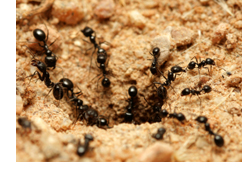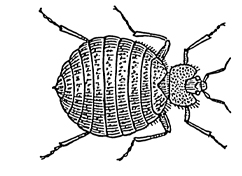Pest Management
Ants. Fleas. Bedbugs. Mice. These unwelcome guests in your room or apartment can be more than a nuisance. Some destroy your food and property, affect your health—and your bank account.
To address pest problems that may surface in Stanford residences, Student Housing has created an integrated pest management program that:
- Educates residents how to prevent, identify, report, and alleviate pest problems in their rooms or apartments;
- Trains staff and provides operational procedures to identify and eliminate sources of pests;
- Responds using protocols to address specific problems brought to our attention; and
- Provides environmentally-sound pest control services by a professional pest control management company.
How to Report Pest Problems
To report pest problems, submit a Fix-it request form or contact your Housing Building Manager or Housing Front Desk. For urgent problems, call the emergency maintenance hotline at 725-1602.
Crane Pest Control handles pest control for Student Housing, and a representative is on campus from 8:00 a.m. to 4:30 p.m. Monday through Friday except holidays. If you call the emergency maintenance number at 725-1602 after hours or on weekends, a duty supervisor will handle your call and determine if it is feasible to bring the pest control representative back to campus.
How To Prepare For A Pest Control Visit
Before Crane Pest Control applies any insecticide, you must
- Properly cover and protect food, utensils, and work surfaces to prevent contamination;
- Minimize clutter, which may harbor insects and rodents;
- Clean with the understanding that a dirty mop, discarded lemon peel, or open bottle of juice can serve as breeding material for fruit flies; and
- Leave lockers, cabinets and closets unlocked for access by technicians.
Pest Control Chemicals
If you request pest control action for your residence, Crane Pest Control will give or leave you a notice with information on the agent it used, along with instructions for you to follow after the pests have been eliminated. If you have questions or concerns, please call the emergency maintenance hotline at 725-1602.
How to Prevent and Alleviate Pest Problems
Prevention is the best medicine, so please review this information from Crane Pest Control to learn how to prevent or alleviate pest problems.
Ants prefer different foods according to species and environmental conditions. Some ants favor sweets, others favor meat, and still others zero in on seeds and plants.
Good housekeeping is crucial, because ants will go elsewhere if there is no food and water to attract them. Ants venture indoors looking for food, especially during the winter rains and summer heat.
To temporarily resolve ant problems, spray the ant trail using a bottle filled with a household cleaner such as isopropyl alcohol, or a 50/50 mixture of vinegar and water. If you eliminate the chemical markings on their trail, fewer ants will follow it in from outside. Also, keep all food in sealed storage containers to eliminate ant temptations from your counters, floors, and garbage.
If the problem persists, submit a Fix-it request or report the problem to your Housing Supervisor or Housing Front Desk.
Bedbugs usually bite people while they sleep since the bedbug is a nocturnal feeding insect. Evidence of bedbug bites comes from blood spots on bed clothing and skin irritation from salivary secretions.
Read "What You Should Know about Bedbugs" for important information about prevention of bedbugs and Student Housing’s response to this problem.
Cockroaches can go for weeks without food or water, and they breed and hide in trash. Discourage roaches by keeping your home neat and clean. Store food in containers that roaches can’t penetrate.
Fleas live primarily on warm-blooded animals, especially feral cats. They pierce their host’s skin for blood meals and lay their eggs on or near their host animals. You can discourage fleas by vacuuming on a regular basis; pay special attention to corners, dark crevices, and under rugs and furniture.
Raccoons, skunks, feral cats, and squirrels can be live-trapped and removed. Call your Housing Supervisor to contact the Crane Pest Control representative. Caution: Skunks in particular are potential rabies carriers.
Rats and mice look for food and shelter indoors during the rainy season. To prevent rodent infestations, clean up food sources and close off pest entry points. Outdoors, make sure to keep your residence and surrounding property clear of trash and debris. Use of patio areas as storage will provide a place for rodents to live. Indoors, keep doors closed, remove trash, and vacuum all cracks and crevices from floor to ceiling. Use steel wool to seal small holes. Mice only need 1/4 of an inch opening to get in; rats, 1/2 inch.
Snakes are mostly beneficial and should not be disturbed. However, if you don’t want snakes near your residence, Crane Pest Control representatives have implements for picking them up and relocating them.
Spiders, looking for warmth, move indoors during the winter, so be careful to shake out anything that has been stored outside or in a basement, especially firewood or other items that have been placed against walls. To make your residence less attractive to spiders, eliminate the insects they eat and vacuum their webs. Spray spiders directly with a household cleaner such as Windex. This can be effective if you can locate their hiding place.


